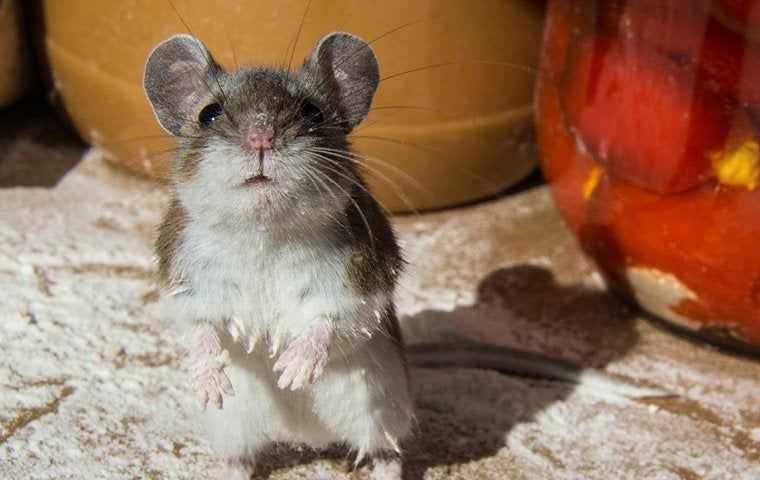What are the building blocks of effective and long-lasting mouse control in your Parrish home? The secret to success is found in the science of zoology. The habits, food preferences, behavior patterns, and nesting habitats of mice provide insights into what can work to manage mice in your yard and keep them out of your home. If you already have an infestation, you'll need to know how to get rid of mice using natural methods or control products. Join us today as we break down the key elements of mouse management and control. We'll look at how you can detect an infestation, what mice do inside your home, what works best to remove mice, and how to keep mice out for good. If you want to say goodbye to mice forever, you'll find the solution here. For immediate assistance with pest control in Parrish, don't hesitate to call us or connect with us through our contact page. We're here to help you find answers to your pest concerns.
How To Tell If It's Mice In Your Home

The first step in any control problem is determining what pest is pestering you because it helps to select the right control options and strategies. In the case of mice, it is possible to think that you have a mouse infestation when you actually don't. Mice aren't the only animals that make noises in your walls or leave droppings in your home. Here are some common warning signs of a mouse problem and how to interpret the signs.
Droppings: The waste material of mice can provide all the information you need. Mouse droppings are slightly smaller than grains of rice and entirely black. You'll find mouse droppings in dark voids, behind ground clutter, and in secluded spaces. When you find droppings, clean them up. By doing this, you can check back to see if new droppings appear. When you continue to see droppings, you know you have an active mouse infestation. As you work to clean up mouse waste, wear protective gear, such as rubber gloves and a mask or a respirator.
Nests: Mice collect soft materials and create nests in hidden places. You may find a soft wad of materials inside the drawer of a stored dresser, droppings around a rip in a stored mattress, soft materials stuffed in an attic gap, etc. Inspect every secluded space and check every hiding place within stored items.
Traps: You can lay a mouse trap to catch a mouse. Use a food source that mice will take, such as peanut butter. Place the trap near a wall and use rubber gloves when setting and handling the trap. Keep in mind that trapping mice is only one part of a control plan. It will not provide a complete solution. Contact a professional for complete rodent control, population management, exclusions, and surveillance.
It is not only important to contact a professional to successfully arrest your rodent infestation; effective rodent control is essential. There are many ways rodents can present a threat within the walls of your home. Let's quickly look at the dangers.
Mice Can Spread Diseases And Damage Property
A mouse doesn't look like a big threat, which is why some people casually deal with mouse problems rather than get professional mouse control services. But, how bad are they really? Should it concern you to have mice crawling around inside your home? Only you can decide. Here are some facts you should know:
- Mice chew on wires and gas lines. They can't help it. They are constantly chewing on things in their environment because they have ever-growing incisors that will harm them if they don't file those teeth down. When a wire is cut, it can spark a fire. Experts believe that 20 to 25 percent of fires that spark from unknown sources are likely related to rodent infestations.
- Mouse droppings are a source of contamination, and some species spread Hantavirus. Mice don't just leave droppings as they explore your home, they leave them in their nests. Contact between their hair and feces makes mice a source of contamination when they explore food storage areas and kitchens.
- Mice leave droplets of urine as they explore. Over time, the urine left by mice in attic spaces can contaminate insulation.
- Mice carry ticks and fleas. As they move about in your home, they can deposit eggs, larvae, and adult ticks and fleas. We recommend checking resources on tick and flea diseases on the CDC website to learn more.
- Mice chew holes in stored items and can cause damage that is difficult or impossible to repair. Along with this, they soil the items they crawl on.
We can't tell you how much of a threat mice pose in your home. All we can do is share the facts and tell you that the mouse population is only going to grow. As it grows, the dangers presented here will grow with the population.
Contact The Pros For Effective Mouse Elimination
There is a science to rodent control. Pest professionals are scientists who apply the scientific method to address infestations. Let's take a moment to break down mouse control into categories that demonstrate the process.
- Mice are attracted to smells. There are many scents that can bring mice into your home. Your pest professional can advise you on key alterations that will deter mice. For example, a professional may explain how insulation contaminated with mouse urine will create a scent that attracts mice to your attic.
- Mice have poor eyesight and must use their other senses to navigate. For example, mice touch objects around them with their bodies, that's why they run along walls. They also use their whiskers to feel around openings. A professional may alert you to clutter that will attract mice or seal openings that invite mice to enter your home. Sealing openings blocks access so mice don't continue to enter your home.
- Mice are impressive climbers. They can scale trees and leap from branches to get on your roof. They can also fall from surprising heights without dying because they twist their bodies and use their hair to reduce terminal velocity. It is amazing to watch a mouse fall twelve feet and scurry away unharmed. Therefore, your pest professional may point out tree branches that you could trim to keep mice out.
- Mice are smart. They have many behavior patterns and natural abilities that allow them to avoid traps. Here are some examples: They may smell the scent of the last mouse that was caught with the trap and avoid it. They may eat all the food off of a latch without springing the trap. They may move quickly and avoid the swing of the hammer on a trap. Professionals use traps and methods that counteract the natural patterns and abilities of pest mice.
- Mice are quiet. The words, quiet as a mouse, are far truer than you might know. You can have mice continue to live in your home after you've caught a couple. A pest professional knows how to inspect your home, apply surveillance, and track the success of a rodent control program.
When you want to get control of mice, contact a mouse control company in Parrish. DIY mouse control can make your problem worse, or cause you to have trouble with mice far longer than is needed. Consider Westfall's Lawn and Pest for industry-leading mouse control solutions. Our highly trained pest professionals use techniques developed by industry experts and get the best results.
Simple Tips To Prevent Mice From Coming Back
Once you've invested in home pest control in Parrish, you're going to want to make that investment count. We get it. Let's quickly look at how to keep mice out of your house for good. Some of these tips will build off of the facts we've shared thus far.
- Remove ground clutter in your yard so mice have more difficulty navigating.
- Trim vegetation in your landscaping to remove hiding places.
- Manage your exterior trash to reduce smells that can attract pest mice from a distance.
- Put bird feeders well away from your home or exterior doors.
- Use hardware cloth to block access to the voids underneath structures.
- Use expanding foam to fill in any gaps around your plumbing and other utilities.
- Stuff some wire mesh in your downspouts to prevent mice from wriggling and climbing up to your roof.
- Trim branches away from your roofline.
- Install guards on any pipes that provide a route for mice to scale your exterior.
- Repair damaged screens, weatherstripping, door sweeps, and other protective materials.
- Keep the interior of your home as clean as possible to remove food debris and ground clutter.
- Store certain foods inside sealed plastic containers to keep the scent of food contained.
- Establish a time when your dog(s) or cat(s) feed, so that food is not left out for mice to eat at night.
You can stop mice from entering your home if you remove attractants, address entry points, remove routes, and keep things clean. If more control is needed, due to higher-than-normal rodent pressures in your yard, contact Westfall's Lawn and Pest for advice or control options. We know what you're up against and we can help you find answers!

What Our Customers Are Saying
"Jimmy was a lot of help for me and my family from the very beginning. His professionalism and knowledge is what every homeowner needs. I will definitely recommend this company to all my friends and family."



